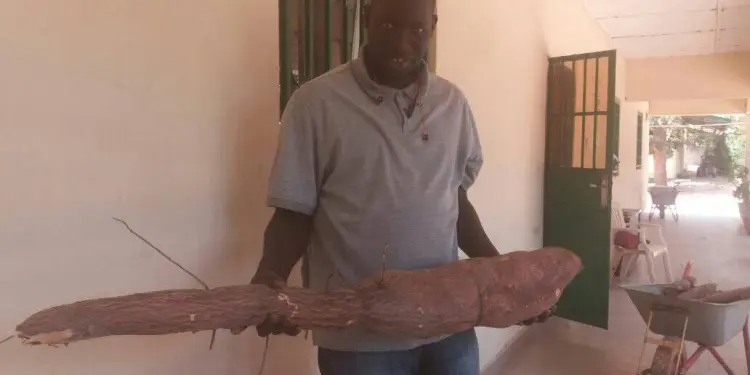
The National Agricultural Research Institute (NARI) in conjunction with various private sector development partners, had launched a conglomerate cassava production and commercialization activity in the Gambia. It is geared towards helping the cassava growers realize some large-scale production and market improvements of the crop in the country.
According to the Officer-in-Charge of the Horticulture Unit under the Crop Research Directorate, Mr. Tom Senghore, the cassava program is not a project per se but an ongoing activity conducted by his Unit in partnership with GIZ International Services- the funder of the cassava program under the Tekki Fii project funded by the European Union (EU); Global Youth Innovation Network (GYIN) Gambia Chapter; ASPUNA Gambia Limited; and the Horticulture Technical Services of the Department of Agriculture, to make sure cassava production is boosted in the country since there now exists a market for this crop in the Gambia. He said they want to commercialize the cassava, simply put, “making it a cash crop is our target in the country”.
The agriculturist revealed this information to GYIN Gambia’s M&E officer yesterday in an exclusive interview at his office in Yundum, stating the activity is meant to support youth by growing enough cassava for commercialization because ASPUNA Company Limited is here, ready to purchase this crop on a large scale and process it into finished products such as flour and starch in the country. While the flour would be for the local market, the starch, as he said, would be exported out of the Gambia.
“The issue of farmers complaining about lack of market is already solved by Aspuna Company Limited situated in Duawa-Su in Kombo East-West Coast Region,” the Horticulture Unit head assured. He continued that his office came into the activity to help sensitize farmers on how to make satisfactory yield to be able to sell to the company on a “win-win” scale, reasoning Aspuna buys one kilogram of the cassava tubers for six dalasi (D6.00) and farmers saw this as a small price for local varieties which was a fact. But with the imported and improved cassava variety, Senghore believes farmers could produce more on the same size of the land and that would enable them to earn more cash in return as well as profits.
He noted that in the Gambia, people use the cassava on a limited scale in terms of finished products but argues that the crop can be consumed or utilized in several ways. Revealing his office is partnering with centers of excellence around the globe such as the International Institute for Tropical Agriculture based in Nigeria, the Gambian horticulture expert informed that, they usually import varieties from external partners to improve on them by conducting multiplication, screening, adaptability trials, palatability test, consumer taste, and preference to find out if such varieties could do better in the Gambia before expanding them to the rest of the country.
He said the selection process of youth in the Lower River Region, West Coast Region, and Upper River Region was done because the GIZ Tekkii FII project operates within these three regions; that GYIN Gambia played an important role in selecting these youth in all the targeted regions for this cassava activity.
The Crop Research Directorate official further said Aspuna Gambia Limited is giving out fertilizer to these farmers for better production and to boost the quality of the crops, as the company plans to purchase all of it after harvest.
Senghore went on to disclose that his office has distributed the new variety to twenty farmers, each farmer receiving 500 cuttings; but he pointed out that the overall activity targets about 100,000 to 200,000 cuttings to be made available to farmers. He promised, “All trained farmers under these out-grower schemes will be given cuttings of these improved cassava varieties.”
OiC Senghore held that Aspuna Company limited could process over 25,000 tons in four hours, therefore reassuring a market for cassava growers in the country with the presence of this company. There are different food products one could get from cassava, as Senghore described it as a climate-resilient crop that could withstand longer draught compared to other crops.
On the challenges their activity faced, the Horticulture Unit’s Officer-in-Charge recalled that farmers were skeptical about the weighing scale and selling their products in kilograms since Gambian farmers are always used to the local ‘Saam’ [allot] way of selling crops in local markets. However, he said his office has conducted several sensitization programs for farmers apprising them that it’s actually in their best interest to formally and properly weigh their crops and products before selling.
Agronomist Senghore maintained if “farmers develop” in this country then that would trickle down to the grassroots economy thereby triggering economic growth; while disclosing plans are underway to have this activity as a national project.
He concluded by intimating that his office would give all the necessary support to local farmers and agricultural entrepreneurs so as to boost agricultural production in the country.
